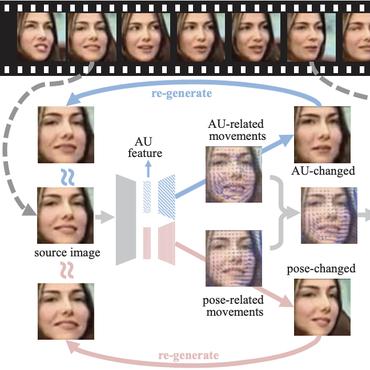Search Results for author: Yan Tong
Found 12 papers, 1 papers with code
LAMPER: LanguAge Model and Prompt EngineeRing for zero-shot time series classification
no code implementations • 23 Mar 2024 • Zhicheng Du, Zhaotian Xie, Yan Tong, Peiwu Qin
This study constructs the LanguAge Model with Prompt EngineeRing (LAMPER) framework, designed to systematically evaluate the adaptability of pre-trained language models (PLMs) in accommodating diverse prompts and their integration in zero-shot time series (TS) classification.
Dual-Channel Reliable Breast Ultrasound Image Classification Based on Explainable Attribution and Uncertainty Quantification
no code implementations • 8 Jan 2024 • Shuge Lei, Haonan Hu, Dasheng Sun, Huabin Zhang, Kehong Yuan, Jian Dai, Jijun Tang, Yan Tong
This paper focuses on the classification task of breast ultrasound images and researches on the reliability measurement of classification results.
Feature-level and Model-level Audiovisual Fusion for Emotion Recognition in the Wild
no code implementations • 6 Jun 2019 • Jie Cai, Zibo Meng, Ahmed Shehab Khan, Zhiyuan Li, James O'Reilly, Shizhong Han, Ping Liu, Min Chen, Yan Tong
In this paper, we proposed two strategies to fuse information extracted from different modalities, i. e., audio and visual.
Identity-Free Facial Expression Recognition using conditional Generative Adversarial Network
no code implementations • 19 Mar 2019 • Jie Cai, Zibo Meng, Ahmed Shehab Khan, Zhiyuan Li, James O'Reilly, Shizhong Han, Yan Tong
A novel Identity-Free conditional Generative Adversarial Network (IF-GAN) was proposed for Facial Expression Recognition (FER) to explicitly reduce high inter-subject variations caused by identity-related facial attributes, e. g., age, race, and gender.
 Facial Expression Recognition
Facial Expression Recognition
 Facial Expression Recognition (FER)
+1
Facial Expression Recognition (FER)
+1
Probabilistic Attribute Tree in Convolutional Neural Networks for Facial Expression Recognition
no code implementations • 17 Dec 2018 • Jie Cai, Zibo Meng, Ahmed Shehab Khan, Zhiyuan Li, James O'Reilly, Yan Tong
In this paper, we proposed a novel Probabilistic Attribute Tree-CNN (PAT-CNN) to explicitly deal with the large intra-class variations caused by identity-related attributes, e. g., age, race, and gender.
Island Loss for Learning Discriminative Features in Facial Expression Recognition
1 code implementation • 9 Oct 2017 • Jie Cai, Zibo Meng, Ahmed Shehab Khan, Zhiyuan Li, James O'Reilly, Yan Tong
Over the past few years, Convolutional Neural Networks (CNNs) have shown promise on facial expression recognition.
 Ranked #3 on
Facial Expression Recognition (FER)
on SFEW
Ranked #3 on
Facial Expression Recognition (FER)
on SFEW
 Facial Expression Recognition
Facial Expression Recognition
 Facial Expression Recognition (FER)
Facial Expression Recognition (FER)
Optimizing Filter Size in Convolutional Neural Networks for Facial Action Unit Recognition
no code implementations • CVPR 2018 • Shizhong Han, Zibo Meng, Zhiyuan Li, James O'Reilly, Jie Cai, Xiao-Feng Wang, Yan Tong
Most recently, Convolutional Neural Networks (CNNs) have shown promise for facial AU recognition, where predefined and fixed convolution filter sizes are employed.
Incremental Boosting Convolutional Neural Network for Facial Action Unit Recognition
no code implementations • NeurIPS 2016 • Shizhong Han, Zibo Meng, Ahmed Shehab Khan, Yan Tong
Experimental results on four benchmark AU databases have demonstrated that the IB-CNN yields significant improvement over the traditional CNN and the boosting CNN without incremental learning, as well as outperforming the state-of-the-art CNN-based methods in AU recognition.
Improving Speech Related Facial Action Unit Recognition by Audiovisual Information Fusion
no code implementations • 29 Jun 2017 • Zibo Meng, Shizhong Han, Ping Liu, Yan Tong
Instead of solely improving visual observations, this paper presents a novel audiovisual fusion framework, which makes the best use of visual and acoustic cues in recognizing speech-related facial AUs.
Detecting Small Signs from Large Images
no code implementations • 26 Jun 2017 • Zibo Meng, Xiaochuan Fan, Xin Chen, Min Chen, Yan Tong
Experimental results on a real-world conditioned traffic sign dataset have demonstrated the effectiveness of the proposed method in terms of detection accuracy and recall, especially for those with small sizes.
Listen to Your Face: Inferring Facial Action Units from Audio Channel
no code implementations • 23 Jun 2017 • Zibo Meng, Shizhong Han, Yan Tong
Different from all prior work that utilized visual observations for facial AU recognition, this paper presents a novel approach that recognizes speech-related AUs exclusively from audio signals based on the fact that facial activities are highly correlated with voice during speech.
Facial Expression Recognition via a Boosted Deep Belief Network
no code implementations • CVPR 2014 • Ping Liu, Shizhong Han, Zibo Meng, Yan Tong
A training process for facial expression recognition is usually performed sequentially in three individual stages: feature learning, feature selection, and classifier construction.
 Facial Expression Recognition
Facial Expression Recognition
 Facial Expression Recognition (FER)
+1
Facial Expression Recognition (FER)
+1




